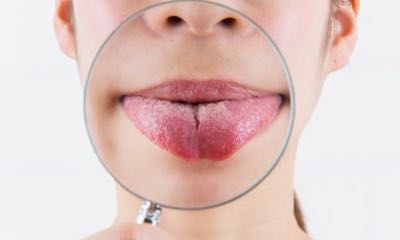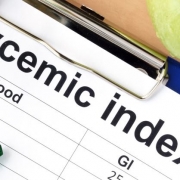5 Things Your Tongue Is Trying to Tell You About Your Health
Turns out watching your tongue should apply to more than just your words. There’s a lot that doctors—and you—can tell about your overall health just by looking at the color, size, and texture of your mouth’s unsung hero.
You already know that your tongue is essential for tasting and digesting food and for articulating speech. But because your tongue is such an integral part of several important bodily functions, paying attention to its appearance and changes can help alert you to larger health issues early. This is one reason your doctor has you stick out your tongue during annual physical exams. And why your dentist may inquire about your hydration or hygiene after one glance at your tongue.
In general, a healthy tongue is dark pink, moist, firm, and covered in small bumps called papillae. If your tongue’s appearance deviates at all from this norm, consider the following five concerns your tongue might be trying to warn you about.
1. Dehydration
When your body is dehydrated—meaning it doesn’t have enough fluid to function optimally—one of the earliest symptoms is a dry tongue and mouth. This is because your body decreases the amount of saliva it’s producing in an effort to conserve fluids. In addition to experiencing a dry mouth, lack of adequate saliva can also affect your ability to break down any foods you may eat. And it can lower your ability to keep teeth healthy, too.
The immediate solution to dehydration is obvious: drink more water. The Food and Nutrition Board of the National Academies of Sciences, Engineering, and Medicine (a U.S. organization) recommends that men consume 15.5 cups (3.7 liters) of fluid per day and women should aim for 11.5 cups (2.7 liters). Keep in mind that these numbers include all daily fluid intake, from both food and liquids. Also consider that circumstances like hot weather or exercise will require you to consume more fluids to stay hydrated.
Most healthy people can stay hydrated simply by drinking fluids when they feel thirsty. Neurons located in the brain are involved in monitoring food and beverage intake and blood levels to regulate thirst by sending hormonal messages that induce drinking. And taste buds send messages back to the brain about the ingested fluids before they reach the bloodstream to signal that thirst has been quenched.
In some cases, though, simply drinking more liquids may not do the trick for solving the dry mouth issue. Dehydration, while a common cause, isn’t the only condition that can trigger dry mouth. Certain medications, medical treatments, or health conditions may also be responsible for making your tongue feels like it’s been marooned in a desert.
2. Changes in Your Oral Microbiome
There’s bacteria and all manner of microbes in your mouth—and your tongue certainly isn’t exempt. At first, that might seem gross. But you have to get used to it, because your oral microbiome is an important part of a healthy mouth.
And if you’re wondering how the balance of your oral microbiome is doing, take a look at your tongue. If your tongue appears normal, it’s a good sign, pointing towards a healthy balance of microbes making their home in your mouth.
When your tongue looks like it has a white coating, it might be time to spend some energy on your oral microbiome. That probably means taking more care with your oral hygiene. (And checking out the tips for a healthy tongue you’ll see below.)
3. Immune System Alert
So many parts of your body play a direct or supporting role in maintaining immune health. Your tongue has a tangential tie to immune health through its role in digestion. But it also can be a red (or white) flag.
If your immune system is struggling—from any variety of normal, occasional lifestyle factors—your tongue will tell you. Some of the signs are similar to those mentioned in the oral microbiome section above.
Normally, your immune system doesn’t just let too much of anything set up camp on your tongue. Yeast is a great example of this. There’s probably always some of these tiny foreign invaders in your mouth and on your tongue. But your body’s defense system is set up to prevent too much yeast from living in your mouth and on your tongue.
When your tongue is coated in white, that could be an indication your oral microbiome is out of balance. And it’s a good idea to support it with immune-helping habits.
Your doctor can also tell, just from looking at your tongue, if you have a couple of different issues going on. So, if you notice your tongue being really red, have a health-care provider take a look. (Unless you’ve just consumed some red food or drink—in that case, you’ll be OK.)
4. Nutritional Deficiencies
Your tongue helps you taste, enjoy, and even properly digest your food. But if you aren’t eating enough of certain nutrients, your tongue could tell on you.
When your tongue is deep red, it might be time to adjust your diet. So, take a look at your intake of two vitamins (B12 and folic acid) and one mineral (iron). All these essential nutrients are readily available in a healthy diet.
Vitamin B12 can be found in seafood, beef, and eggs. Folic acid (also known as vitamin B9) is in legumes, broccoli, and spinach. And if you’re looking to add iron to your diet, go with poultry, organ meats, beans, and nuts.
5. Excessive Stress
Turns out stress wreaks havoc throughout your body. And your tongue can’t escape the ravages of stress, either.
Tongue redness is one hallmark of stress. Canker sores and stress ulcers on your tongue could be a sign that you’re stressed. If your tongue is scalloped around the edges, that could mean you’re consistently biting your tongue in reaction to stress.
And your taste buds aren’t immune from the strain of life. Researchers suggest your taste buds are impacted by stress, as well.
So, practice self-care to help alleviate some of the stress in your life. Your mind, body, and mouth will all benefit.
Don’t Forget About Proper Hygiene
Aside from good nutrition, adequate hydration, and not smoking, the best thing you can do for your tongue is to practice good oral hygiene habits. Try these tips to help keep your tongue happy and healthy.
Scraping
You already know you need to brush your teeth at least twice a day (bonus points for brushing after every meal). While you’re at the sink, why not add the quick extra step of scraping your tongue? Use an inexpensive plastic or metal tongue scraper to swipe one or two times per area down the length of your tongue. Go from back to front, being sure to wipe or rinse off any debris in between each scrape. In addition to removing bad-breath-inducing bacteria, research suggests scraping your tongue twice a day might also improve your sense of taste.
Brushing
Does the thought (or actual action) of scraping your tongue make you gag? You can get some bacteria-killing action by making your toothbrush multitask. Brush your tongue vigorously in multiple directions after you’ve given your teeth a good scrub. Just don’t get too crazy—you don’t want to damage your delicate taste buds or the mucosa (that’s the pink tissue that covers your tongue).
Oil Pulling
A few small studies have found that an ancient practice of swishing oil around in your mouth for up to 20 minutes once per day can reduce odor- and certain decay-causing bacteria, when done consistently as part of a complete oral hygiene routine. Oil pulling, as it’s known in Ayurveda, is typically done using cold-pressed oils like sunflower, sesame, and coconut. Oil pulling can help keep your tongue healthy by eliminating bad bacteria, but it can also help symptoms of dry mouth and chapped lips. If you’re someone who experiences discomfort when using alcohol-based or other full-strength mouthwashes, oil pulling might be a gentler alternative for you to try. When you’re done swishing, spit the oil into a lined trash can (don’t spit oil down your sink!) and rinse your mouth with water. (There is no scientific evidence the practice whitens teeth, pulls toxins out of the body, or treats any disease.)
Listen to Your Tongue
The tongue is more than just the muscular organ that lives in your mouth. It can also be an invaluable prognosticator when it comes to other health issues. In order to heed any warnings your tongue might be sending you, though, you need to pay attention to it and take good care of it.
Stick your tongue out and examine in the mirror its color, shape, size, and texture frequently and alert you doctor if you detect any unusual changes. And don’t forget your tongue during your oral hygiene routine! Because it’s an instrumental tool for your digestive system and speech, giving it a little extra love is well worth the effort.
References
https://exploreim.ucla.edu/wellness/what-your-tongue-can-say-about-your-health/
https://health.clevelandclinic.org/what-your-tongue-can-tell-you-about-your-health/
https://www.piedmont.org/living-better/what-your-tongue-can-tell-you-about-your-health
https://www.healthline.com/health/dental-and-oral-health/tongue-scraping#misconceptions
https://www.health.com/oral-health/tongue-health-conditions
https://www.healthline.com/health/stress-ulcer#stress-and-ulcers
https://www.anxiety.org/the-effects-of-stress-on-our-sense-of-taste
















